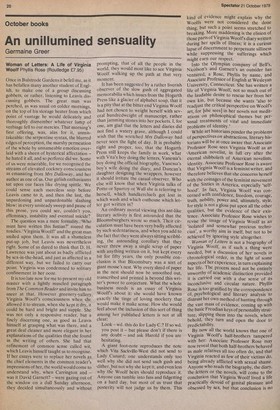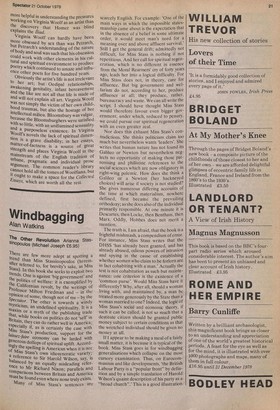October books
An unillumined sensuality
Germaine Greer
Woman of Letters: A Life of Virginia Woolf Phyllis Rose (Routledge £7.95) Once in Bulstrode Gardens it befell me, as it has befallen many another student of Engl ish, to make one of a group discussing gobbets, or rather, listening to Leavis discussing gobbets. The great man was perched, as was usual on colder mornings, on the top of his storage heater from which point of vantage he would delicately and thoroughly dismember whatever lump of verbiage fell to our mercies. That morning's first offering, was, alas for it, unmis takeable: the serpentine syntax, the blurred edges of perception, the marshy permeation of the whole by unnameable emotion overlaid with a sheen of hysterical affectation — he hated it all, and so perforce did we. Some of us were miserable, for we recognised the streams of elevated cockney consciousness as emanating from Mrs Dalloway, and her author as one of us. Our girlish enthusiasms sat upon our faces like drying spittle. We could sense each merciless snip before Leavis came to it, and then the last, the unpardoning and unpardonable slashing blow: in every unsteady sweep and pause of this prose, you could see, couldn't you, effeminacy, instability and eventual suicide?
The question was a mere formality. 'Who must have written this fustian?' roared the toadies. 'Virginia Woolf!' and the great man smiled upon them. It was all a shameless put-up job, but Leavis was nevertheless right. Some of us dared to think that D. H. Lawrence was just about as badly afflicted by sex-in-the-head, and just as affected in a different way, but we failed to carry our point. Virginia was condemned to solitary confinement in her ooze.
It is too late now for me to present my old master with a lightly muscled paragraph from The Common Reader and invite him to sneer at that. However greenery-yallery Virginia Woolf s consciousness when she allowed it to stream, when she kept it dry, it could be hard and bright and supple. She was not only a responsive reader, but a finely discerning one, as good as Leavis himself at grasping what was there, and a great deal cleaner and more elegant in her explanations of the qualities that she found in the writing of others. She had that refinement of common sense called wit, which Leavis himself taught us to recognise. If her essays were to replace her novels as the chief elements in the common reader's impressions of her, the world would come to understand why, when Carrington and — was it David Garnett? were gazing out of the window on a dull Sunday afternoon, they decided simultaneously and without prompting, that of all the people in the world, they would most like to see Virginia Woolf walking up the path at that very moment.
It has been suggested by a rather liverish observer of the slow gush of aggregated memorabilia which issues from the tlogarth Press like a glacier of alphabet soup, that it is a pity that at the bitter end Virginia Woolf had not chosen to weight herself with sev eral hundredweight of manuscript, rather than jamming stones into her pockets. I, for one, am glad that the letters and diaries did not find a watery grave, although I could wish that the wretched Mrs Dalloway had never seen the light of day. It is probably right and proper, too, that the Hogarth Press still keeps the family in work, what with Vita's boy doing the letters, Vaness-a's boy doing the official biography, Vanessa's boy's wife doing the diary, and Duncan's daughter designing the wrappers, however it, should irritate the casual observer. Who else will know that when Virginia talks of Potto or Sparroy or Wall she is referring to herself, which handkerchiefs got lost in which wash and which outhouse which letter got written in?
An ordinary mortal viewing this ant-like literary activity is first astounded that the Bloomsburghers wrote so much. Their cir culation must have been very badly affected by such sedentariness, and when you add to the fact that they were always sitting scribbl ing, the astounding corollary that they never threw away a single scrap of paper with anything written on it, but kept every bit for fifty years, the only possible conclusion is that Bloomsbury was a sort of giant mouse's nest. Why every shred of paper in the nest should now be smoothed out, transcribed and printed is beyond this wri ter's power to conjecture. What the whole business needs is an essay of Virginia Woolfs about it: she would have known exactly the tinge of loving mockery that would make it make sense. How she would feel about the inclusion of this sort of thing among her published letters is not at all clear: Look — wd. this do for Lady C.? If so wd. you post it — but please don't if there is any doubt — and ask Harold if you are hesitating.
A giant foot-note reproduces the note which Vita Sackville-West did not send to Lady Cunard; one understands only too well why she did not send such gush and dither, but not why she kept it, and even less why the Woolf heirs should reproduce it.
Anyone can tumble into fuss and fidgetting on a hard day, but most of us trust that posterity will not judge us by them. This kind of evidence might explain why the Woolfs were not considered the done thing, but such a point seems stretched to b ing. More maddening is the elision of those of Virginia Woolfs diary written during her spells of illness; it is a curious lapse of discernment to perpetuate silliness while suppressing the sufferings which might earn our respect. Into the Olympian company of Bell's, Nicolson's and Garnett's an outsider has ventured, a Rose, Phyllis by name, and Associate Professor of English at Wesleyan University, Connecticut. She has written a life of Virginia Woolf, not so much out of the laudable desire to rescue her from her own kin, but because she wants 'also to readjust the critical perspective on Woolfs art, for [she sees] in her novels not meditations on philosophical themes but personal treatments of vita! and immediate problems of identity.' While art historians ponder the problems of perspectives on abstractions, literary historians will be at once aware that Associate Professor Rose sees Virginia Woolf as an American novelist, in full cry after the eternal shibboleth of American novelists, identity. Associate Professor Rose is aware that Virginia Woolf is a feminist writer, and therefore believes that she concerns herself with the coinages of the feminist movement of the Sixties in America, especially 'selfhood'. In fact, Virginia Woolf was concerned with confidence, freedom, courage, truth, nobility, power and, ultimately, style, for style is not a gloss put upon all the other qualities, but the evidence of their existence. Associate Professor Rose wishes to . revise the image of Virginia Woolf as an 'isolated and somewhat precious technician', a worthy aim in itself, but not to be achieved by ignoring style altogether. Woman of Letters is not a biography of Virginia Woolf, as if such a thing were needed, but a discussion of her novels in chronological order, in the light of some aspects of her experience, in turn explaining her life. The process need not be entirely unworthy. of academic distinction provided it is carried out with a due sense of its inconclusive and circular nature. Phyllis Rose is too gratified by the correspondence of psychological and literary analysis to distrust her own method of hunting through the vast mass of evidence, coming up with the basic Freudian keys of personality structure, slipping them into the novels, where behold, they turn and open the door to predictability. By now all the world knows that one of Virginia Woolf s half-brothers tampered with her: Associate Professor Rose may now reveal that both half-brothers behaved as male relatives all too often do, and that Virginia reacted as few of their victims do, being already afflicted with sexual shame. Anyone who reads the biography, the diary, the letters or the novels, will come to the conclusion that Virginia Woolf lived a life practically devoid of genital pleasure and obsessed by sex, but that conclusion is no more helpful in understanding the pressures working on Virginia Woolf as an artist than the discovery that Homer was blind explains the Iliad.
Virginia Woolf can hardly have been more obsessed by sex than was Petrarch, but Petrarch's understanding of the nature of body and soul was such that his obsession could work with other elements in his cultural and spiritual environment to produce Poetry which continued to amaze and influence other poets for five hundred years. Obviously the artist's life is not irrelevant to her art; but Oedipal relationships, awakening genitality, infant bereavement and the like are not all that life is made of and will not explain all art. Virginia Woolf was not simply the victim of her own child-. h. ood traumas, but also the hostage of her intellectual milieu. Bloomsbury was vulgar, because the Bloomsburghers were satisfied With so little, with an unillumined sensuality and a purposeless' existence. In Virgin la Woolfs novels the lack of spiritual dimension is a grave disability; in her essays, matter-of-factness is a source of great strength and places Virginia Woolf in the mainstream of the English tradition of urbane, pragmatic and individual Prose argument. The common reader's library cannot hold all the tomes of Woolfiana, but it ought to make a space for the Collected Essays, which are worth all the rest.







































 Previous page
Previous page